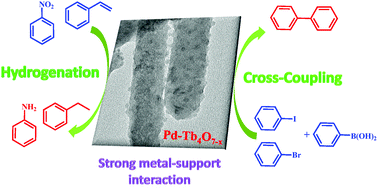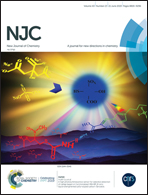Highly active and durable Pd nanocatalyst promoted by an oxygen-deficient terbium oxide (Tb4O7−x) support for hydrogenation and cross-coupling reactions†
Abstract
Heterogeneous catalytic hydrogenation and cross-coupling reactions are of significance in organic synthesis and the petroleum industry. Much attention has been devoted to exploring highly efficient heterogeneous catalysts with low cost and long cycling stability. Herein, we firstly employed terbium oxide (Tb4O7−x) with abundant lattice vacancies as a support and promoter for highly dispersed Pd nanoparticles. The catalytic activity of Pd–Tb4O7−x towards hydrogenation and cross-coupling reactions could also be significantly enhanced by the presence of lattice vacancies and electronic communication between Pd NPs and the Tb4O7−x support. Impressively, the hydrogenation of styrene proceeded smoothly and thoroughly to produce ethylbenzene with a high TOF value of 6437 h−1, and the rate constant k for 4-nitrophenol reduction was measured to be 0.0471 s−1. Moreover, the Suzuki cross-coupling of aryl halides and phenyl boronic acid proceeded smoothly to generate biphenyl within just a few minutes, and the TOF value for iodobenzene and bromobenzene was 8508 h−1 and 2055 h−1, respectively. Additionally, the strong metal–support interaction (SMSI) between Pd NPs and the oxygen-deficient Tb4O7−x support can not only modify the structural and electronic properties, but also prevent Pd nanoparticles from thermal sintering and aggregation during catalytic reactions, resulting in enhanced catalytic performance and stability. The Pd–Tb4O7−x nanocatalyst can be recovered and recycled over 20 times without significant loss in activity. Our newly developed oxygen-deficient Tb4O7−x, which could be an effective promoter or support for metal species, may hold great potential in various catalytic reactions.



 Please wait while we load your content...
Please wait while we load your content...